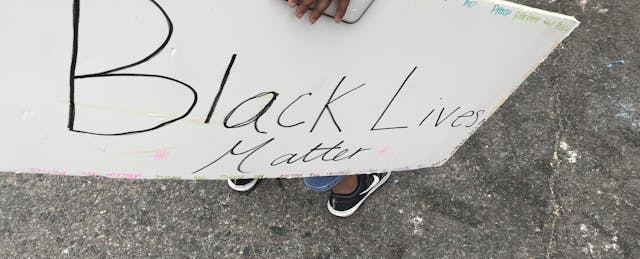At UCLA, classes are still in session—remotely, due to the pandemic—even while National Guard troops patrol near the campus to stop any violence that might arise from protests over the killing of George Floyd.
Many schools and colleges had already completed their terms before a white police officer in Minneapolis kneeled on the neck of Floyd, a black man he was restraining, for eight minutes until Floyd died. But at institutions where classes were still in session, the protests that followed and the consuming national conversation about racism in America have added another layer of tension and drama to an unprecedented school year.
More than 14,000 UCLA students and community members signed a petition calling on the university to cancel or postpone finals, arguing that students, particularly black students, are unable to focus in the current political, racial and public-health turmoil. “Forcing students to continue on with their schooling as if everything is normal is inhumane and shows that the university does not value students’ health,” the petition reads.
In response, the academic senate on Monday met with student leaders to hear their concerns. But the senate told students that systemwide regulations prevent them from cancelling finals, and that academic freedom prevents them from forcing professors to make other alterations to the timing of exams, said Naomi Riley, president of the Undergraduate Student Association Council, who attended the meeting.
Academic senate leaders said they plan to send new guidelines to professors in a campus-wide email, “emphasizing these extraordinary and anxiety-filled times,” according to a statement by student leaders posted on Instagram. UCLA officials did not respond to a request for comment.
Riley said in an interview that some students want to take time to join the protests, and that even those who don’t have been disrupted by a 6 p.m. curfew imposed by city officials earlier in the week. “That makes it nearly unimaginable to complete finals right now,” she said.
Riley did manage to take a break for about an hour and a half on Wednesday to take her final for a political science class. “I just gave a Hobbesian perspective on the #BlackLivesMatter movement,” she says. But she still has three more finals to go.
Meanwhile, UCLA’s Bunche Center for African American Studies held an online forum on Tuesday evening for students to share their feelings and frustrations. The agenda was set by the university’s counseling and psychological services staff to support students, says La’Tonya Rease Miles, director of First Year Experience at the University of California at Los Angeles and co-founder of a Facebook group called Empowering First-Generation College Students. “The forum was a powerful, much-needed healing space for black students, staff and faculty,” she said.
Some K-12 schools called off classes to give students and teachers time to grieve or reflect on the Floyd killing. At least eight charter school networks canceled a day of class, according to Chalkbeat, including KIPP schools in Minneapolis, Newark, New York and Washington, D.C., as well as Alliance College-Ready schools near Los Angeles and Rocky Mountain Prep schools in Colorado.
Where online classes are still in session, many teachers are reaching out to students and holding discussions about the tragic killing and systemic racism.
Some students have been trying to process the moment on their own. Ronaiya Vickham, a 16-year-old student at North High School in Minneapolis, took time from her virtual studies to visit the intersection at 38th and Chicago, where Floyd was killed.
The scene is part vigil, part protest, part street festival. Some have left bouquets of flowers at murals of George Flloyd, while others pose in front of them for selfies. Music blares from speakers at food tables, where volunteers dish out burgers and hot dogs on a pay-what-you-can model. Stacks of produce and groceries sit in the middle of the street for the taking, donated by people to provide for those in the neighborhood now struggling to buy food now that so many stores have been vandalized, burned, or boarded up, though most protesters have been peaceful. Many have brought signs denouncing racism and police violence.
“It’s just a reminder that our brown folks will never be safe, no matter what we do,” she says. “White people in general always have the upper hand against us.”
As for her schoolwork, she admits all this is “distracting.” “I can’t really focus,” she says.
For her, the best therapy has been writing poetry. We asked her to share one she wrote this week. Part of it reads:
“We are not DUMB we are Intelligent and intellectual. We are not violent, we are tired. We are not shy, we are observant. We are not selfish we are proud. We are not ghetto we are creative. We are not quiet we are OUTSPOKEN. And WE ARE NOT BLACK, but we are BROWN.
Don’t tell us how to speak because we don’t sound like you. The whiteness, the boring I’m sorry the professionalism is what you call it. Our words are whole, our phrases ... shiiittt it’s just like our inside jokes that makes us laugh cry or angry. We extra. When we laugh, we make different sounds, we jump , hop, skip, run, fall to the floor, clap, stomp, and hit. We see other brown folks and we see them happy and flyyyy, we don’t hate . … Our brown people are bright.
So I’m telling you, let us be BROWN not WHITE.”


